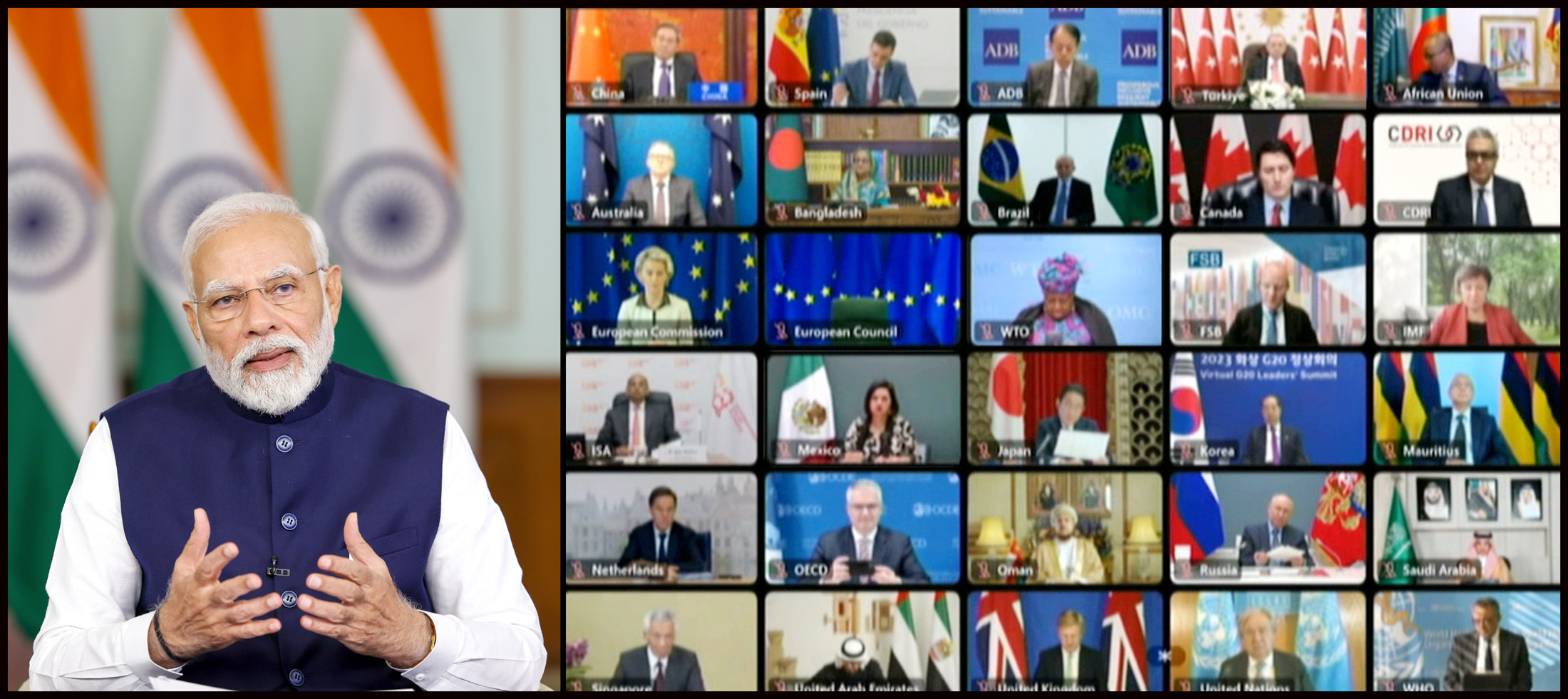
Israel-Hamas conflict, shouldn’t be allowed to shape of a regional-conflict : PM Modi
NEW DELHI : The Israel-Hamas conflict in West Asia, a concern for the world, shouldn’t be allowed to take the shape of a regional-conflict and expand beyond its territory, Prime Minister Shri Narendra Modi said.
Speaking to the world leaders at the opening of the Virtual G20 Leaders Summit, Modi said the leaders have come together at the summit to find a solution to major global issues.
“Disturbances and security-related issues in West Asia are a matter of concern for all of us,” Modi said.
“We recognise that terrorism is not acceptable. Death of civilians anywhere is unfortunate,” he added.
The Israel-Hamas conflict, which began in early October, has led to loss of lives and homes, apart from price volatility, especially of oil and commodity shortage, and instability in the region.
While the conflict is confined to Israel and the Gaza Strip currently, it could soon ripple across the entire Middle East, according to a recent report by the Global Trade Research Initiative (GTRI).
The conflict could also derail the prospect of a historic peace deal between Israel and Saudi Arabia, a lynchpin of the India-Middle-East-Europe Connectivity Corridor (IMEEC) framework, which plans to link Europe, Middle-East and India through rail links and shipping lanes.
Meanwhile, during his opening speech at the summit, Modi said the concerns of the global south will need all the priorities, as developing economies are facing several challenges for which they are not responsible.
The Global South refers to developing, less developed, or underdeveloped countries which experience higher levels of poverty, income inequality, climate issues and challenging living conditions compared to the advanced economies.
“It is important that the global economy and governance structure sees reforms to make them bigger, better, (more) effective, representative and future-ready,” Modi said.
Addressing issues on development and global challenges is the core agenda of the Virtual G20 Summit, which saw the participation of most G20 leaders.
The Delhi Declaration, a statement by the leaders of G20 countries, adopted at the Leaders Summit in September, mentions crucial aspects regarding climate change, conflict in Ukraine, multilateral development banks (MDBs) reforms, crypto assets, and adoption of Digital Public Infrastructure (DPI).
During his opening remarks, Modi said an India-made global DPI repository, consisting of over 50 DPIs from 16 coutries, is ready as India looks to establish a social impact fund to implement DPIs in Global south countries.
India will contribute $25 million as initial capital in the fund and hope other countries are part of the initiative, Modi said.
He also cautioned about the negative impacts of Artificial Intelligence (AI), including risks from Deep Fakes, which are realistic-looking, AI-generated falsified images and videos that can cause harm to national security.
India is organizing a global AI partnership summit next month, which will deliberate on the challenges and opportunities with AI, he said.
“AI should reach the people, but it should be safe for the society,” he added.
Prime Minister Modi also said the upcoming COP28 in UAE will have to take action on decisions on the sustainable development goals (SDGs) taken at the G20 Leaders Summit in September.
The New Delhi summit had brought the new initiative of green credit, apart from defining 2030 SDG goals, green hydrogen initiatives and recognize the need to increase climate finance funding.
As things stand, progress has been made on several SDG issues since the G20 Leaders Summit including consensus on tripling renewable energy capacity globally by 2030, and doubling the global rate of energy efficiency by 2030., which are expected to be key outcomes of COP28.

